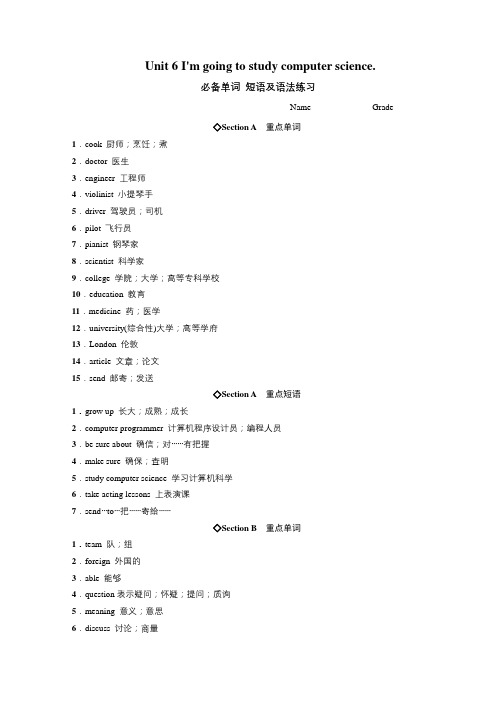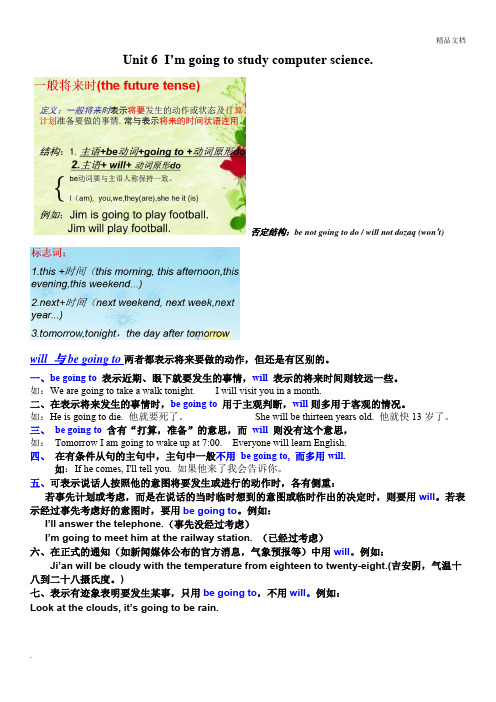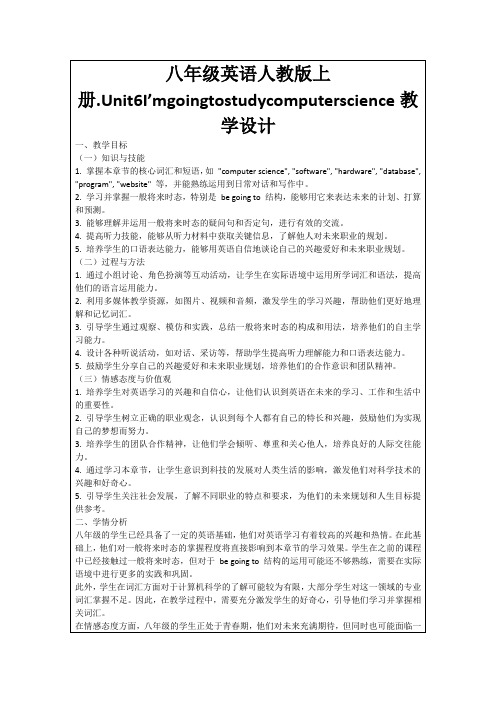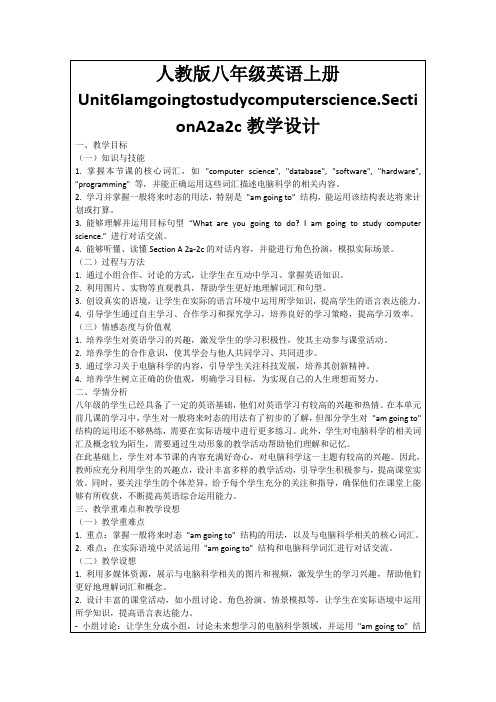8英人教版上册Unit 6 I m going to study computer science单元词句梳理
人教八年级英语上册unit6 I'm going to study computer science

Unit6 I’m going to study computer science.知识点一、课本基础知识归纳1.grow up成长;长大2.be sure about对……有把握3.make sure确信;务必4.send…to…把……送到……5.be able to do sth 能够做某事=can+动词原形6.the meaning of……的意思7.different kinds of不同种类的 a kind of一种8.write down写下;记下9. for example例如10.take up开始做;学着做11. take lessons上课12.try one’s best尽最大努力13.move to +地点搬到…14. get good grades取得好成绩15.make resolutions制定决心16.get lots of exercise 多锻炼17.learn another foreign language 再学一门外语18. sound like 听起来像19. at the beginning of 在…开始时20.eat less fast food 少吃快餐21.have to do with与…有关系have nothing to do with 与…无关22.make a weekly plan 制订每周的计划23.for this reason 为此24. too…to…太……而不能……25.agree with sb 同意某人的观点26.have one thing in common 有一点相同27.be going to+动词原形打算做某事28.practice doing练习做某事29.keep on doing sth.不断地做某事,keep+sth+adj使某物保持……30.learn to do sth.学会做某事31.finish doing sth.做完某事32.promise to do sth.许诺去做某事33.help sb. to do sth.帮助某人做某事34.remember to do sth.记得做某事35.agree to do sth.同意做某事二、重要知识点讲解1.practice (doing) sth练习(做)某事He is going to practice (playing) basketball every day. 拓展:常用-ing形式作宾语的动词口诀:2. keep的用法①keep+n.遵守…We should keep a promise/our words.②keep+adj.保持…He keeps healthy/quiet.③keep+n+adj.使…保持…We should keep the classroom clean.④keep doing sth.一直(持续)做某事My classmates told me to keep going.⑤keep sb doing sth使…一直做某事Don’t keep me waiting too lo ng.⑥keep on doing sth.不断做某事I’m goi ng to keep on writing stories.⑦keep/stop sb from doing sth阻止…做某事We should keep people from cutting down trees.3. be sure①be sure of/about sth对…有把握He is sure of living to 90.他有把握/自信能活到90岁。
人教版八年级上册英语 Unit 6 I'm going to study comp英文教案(表格式)

3. Writing skills: How to write clear and coherent resolutions and plans.
3. Inductive teaching method: Guide students to summarize language rules and usage through examples.
五、Teaching Procedure
Step 1: Warming-up (5 minutes)
三、Teaching Difficult Points
1. How to guide students to express their own resolutions and plans in a logical and comprehensive way.
2. Helping students overcome difficulties in using proper verb forms and sentence structures in their writing.
1. Greet the students and have a free talk about their weekends.
Ask: How was your weekend? What did you do?
2. Show some pictures of people doing different activities and ask students to guess their resolutions.
人教版八年级英语上册Unit6I’mgoingtostudycomputerscience

难点:如何让学生在实际语境中灵活运用一般将来时态,以及如何引导学生正确表达自己的未来职业规划。
2.重点:提高学生的听说能力和口语表达能力,使其能够就未来职业规划进行流畅的交流。
难点:如何在有限的课堂时间内,充分调动学生的积极性,使他们在听说练习中取得实质性进步。
2.学会使用一般将来时态表达未来的计划、打算,如"I'm going to study computer science.",并能运用一般将来时态进行句子构建。
3.能够理解并运用目标语言描述不同职业的特点、工作内容以及所需技能。
4.提高听力技能,能够从听力材料中获取关键信息,了解他人的职业规划。
5.提高口语表达能力,能够就自己的未来职业规划与他人进行简单交流。
a.设计一个职业体验活动,邀请同学参与,共同体验不同职业的工作,提高对职业规划的认识。
b.组织一次英语职业规划演讲比赛,邀请同学担任评委,锻炼口语表达能力,增进相互了解。
作业要求:
1.作业完成后,认真检查,确保无误。
2.按时提交作业,养成良好的学习习惯。
3.积极参与课堂讨论和分享,提高英语综合运用能力。
2.过程说明:学生通过小组讨论,相互交流职业规划,提高口语表达能力,同时加深对他人职业选择的理解。
(四)课堂练习
1.教学活动设计:教师设计一些与职业规划相关的练习题,如填空、选择、匹配等,让学生在课堂上完成。
2.练习内容:练习题涵盖一般将来时态的用法和职业规划相关词汇,帮助学生巩固所学知识。
3.过程说明:通过课堂练习,让学生在实际操作中掌握一般将来时态,提高运用能力。
4.引导学生进行课堂展示,提高学生的口语表达能力,增强自信心。
人教版八年级英语上Unit6I’mgoingtostudycomputerscience

(一)导入新课,500字
在导入环节,我将采用图片预测和讨论的方法激发学生对未来职业的兴趣。首先,在大屏幕上展示一系列与职业相关的图片,如科学家在实验室工作、飞行员驾驶飞机、医生为患者检查等。同时,提问学生:“What do you think these people do?”让学生观察图片并预测这些人的职业。
三、教学重难点和教学设想
(一)教学重难点
1.重点:学生能够熟练运用与未来职业规划相关的词汇和句型,如“I’m going to ቤተ መጻሕፍቲ ባይዱe a...”和“I’m going to study...”,自信地表达自己的职业理想。
难点:学生能够在实际语境中,灵活运用所学知识进行职业规划的讨论和表达,提高语言综合运用能力。
5.阅读与写作:指导学生阅读相关文章,提取关键信息,并运用所学知识进行写作练习,提高阅读理解能力和写作技巧。
6.课堂小结:通过师生互动,总结本节课的学习内容,巩固所学知识。
7.课后作业:布置适量的课后作业,包括词汇练习、句型练习、阅读理解等,巩固课堂所学。
8.拓展活动:鼓励学生参加课后拓展活动,如职业体验、社会调查等,将所学知识与社会实践相结合,提高综合素质。
人教版八年级英语上Unit6I’mgoingtostudycomputerscience.(SectionA1a2c)教学设计
一、教学目标
(一)知识与技能
1.学生能够掌握并运用与未来职业规划相关的词汇,如scientist, engineer, pilot, doctor, teacher, lawyer, programmer等,以及表达对未来职业意向的句型“I’m going to be a...”和“I’m going to study...”。
人教八年级上册Unit 6 I’m going to study computer science

Unit 6 I'm going to study computer science.必备单词短语及语法练习Name___________ Grade___________◇Section A重点单词1.cook 厨师;烹饪;煮2.doctor 医生3.engineer 工程师4.violinist 小提琴手5.driver 驾驶员;司机6.pilot 飞行员7.pianist 钢琴家8.scientist 科学家9.college 学院;大学;高等专科学校10.education 教育11.medicine 药;医学12.university(综合性)大学;高等学府13.London 伦敦14.article 文章;论文15.send 邮寄;发送◇Section A重点短语1.grow up 长大;成熟;成长2.computer programmer 计算机程序设计员;编程人员3.be sure about 确信;对……有把握4.make sure 确保;查明5.study computer science 学习计算机科学6.take acting lessons 上表演课7.send…to…把……寄给……◇Section B重点单词1.team 队;组2.foreign 外国的3.able 能够4.question表示疑问;怀疑;提问;质询5.meaning 意义;意思6.discuss 讨论;商量7.promise 承诺;诺言;许诺8.beginning 开头;开端9.improve 改进;改善10.physical 身体的11.themselves 他(她、它)们自己12.hobby 业余爱好13.weekly 每周的(地)14.schoolwork 学校作业;功课15.own 自己的;本人的16.personal 个人的;私人的17.relationship 关系;联系◇Section B重点短语1.be able to 能够做某事2.at the beginning of 在……开始3.write down 写下;记录下4.have to do with 关于;与……有关系5.take up (尤指为消遣)学着做;开始做6.make resolutions 下决心;制定计划7.the meaning of………的意思/意义8.make promises to sb.向某人保证/承诺◇词形变换1.violinist→(小提琴)violin2.driver→(动词)drive3.pianist→(钢琴)piano4.scientist→(科学)science→(科学上的;科学的)scientific 5.medicine→(形容词)medical6.foreign→(名词)foreigner7.begin→(名词)beginning8.themselves→(人称代词主格)they→(人称代词宾格)them 9.weekly→(名词)week10.own→(名词)owner11.personal→(名词)person◇重点句型1.—What do you want to be when you grow up?你长大后想做什么?—I want to be a basketball player.我想当一名篮球运动员。
初中英语人教版八年级上册Unit 6 I'm going to study comp

Unit 6 I'm going to study computer science.Period 1 Section A(1a,1b,1c,2a,2b) Part I. Teaching Aims and demandsThe students should learn and grasp structures “be going to”To develop the students’ abilities of listening, speaking, reading and writin g.To train the ability of cooperation.Key words and phrases (10):grow up, computer programmer, cook, doctor, engineer, violinist ,driver, pilot ,pianist ,scientistPart II. Teaching key and difficult PointsEnable the students to learn to talk about future intentions with “be going to”How to make dialogues and act them out.A: What do you want to be when you grow up?B: I want to be a computer programmer.A: How are you going to do that?B: I’m going to study computer science.How to co-operate with the partner.Part III. Teaching aids:computer and CD-ROM; tape recorder ; school things and so on.Part IV. Teaching Methodscommunicating, listening, speaking, acting and group workPartV. Study Methods.1. To be a successful learner by using listening, speaking, game and acting.2. Self---learning methods3. Let the students discuss in groups and develop their keen interest in English. Part VI. Teaching ProceduresStep 1 Lead inAnnounce learning goal to the class. Today we’re going to learn Unit 6 “I’m going to study computer science”.Ask students some questions. “How many jobs do you know?” Encourage students to talk about jobs as many as they can. “What do you want to be when you grow up?”“What are you going to be when you grow up?”Ask students to think about ways they already know to talk about future events. Ask the students to give some questions and answers about future events.Give the students sample questions. For example:Q: Where are you going tomorrow?A: I'm going to the park tomorrow.Q: What are you doing on Sunday ?A: I'm playing basketball.Step 2 Presentation (Deal with 1a.)Ask students to look at the screen. And ask them.“What job is this?”“ pilot , basketball player, actor, computer pr ogrammer”Read the words and dialogue after me.Read each of the words to the class. Ask the students to point to the jobs that appear in the picture. As they point, describe each person.Read the instructions and say, Put a 1 after the most interesting job. Put a 2 after the second most interesting job, put a 12 after the least interesting job and so on.Check to see which things are the most interesting to students in the class. Ask students to write the 12 jobs on their exercise-books. Then ask th e class “What’s your answer?”Step3 Listening (Deal with 1b.) .Read the instructions. Say “You will hear four conversations. After each conversation, draw a line between the job in the first column and the activity in the second column”.Ask the students to look at the screen and give them the correct answers. Ask them to check the answers by themselves. Point out the sample answer and read it to the class.Play the recording the first time. Students only listen. Play the recording again. Ask students to draw lines.Step 4 Pair work (Deal with 1c )Let Ss read the model with a parter. Use the information in the chart of 1b. Ask and answer with a parter. Then look at the other jobs in activity la and have conversations about these jobs. As students talk, move around the classroom checking their work and offer language support as needed.Step 5 Listening (Deal with 2a)Let the students look at the screen. Point to the white box on each picture. Say“ Listen to the recording and check the things Cheng Han is going to do”. And then play the recorder and listen to the tape.Play the recording again. After that, check the answers.Step 6 listening and writing practice (Deal with 2b)Let Ss read the chart below. Tell Ss that they’ll listen to Cheng Han’s plan for the future .They should answer the questions:“What ”means “What does Cheng Han want to be”?“Where” means “Where is Cheng Han going to work?”“How” means “How is he going to do it?”“When” means “When is he going to start?”Play the recording. Ask students to write their answers in the chart. Look at the screen and check the answers.Step7 SummaryIn this lesson, we’ve learned how to talk about future intentions with “be going to”. Step 8 HomeworkCopy the new words on P41, 1a twice each and 1c once.Unit 10 I'm going to study computer science.computer programmer grow up What are you going to be when you grow up? engineer violinist scientist pianist I’m going to be a computer programmer. cook doctor driver pilot How are you going to do that?I’m going to study computer science.Part VII. Teaching Reflection.In this lesson, I have used different kinds of methods to let the students learn how to talk about future intentions with “be going to” And they improved their abilities of listening, speaking, communication and cooperation.PartII. Status and function.Our students have grown up. It’s important for them to think about their dream jobs and what to do for it now. In this lesson they can learn to talk about something they want to do or plan to do in the future. It can make students wok harder at their subjects for their future. In Section A, it is related to the real situation in our daily life, so it’s good for students to practice the sentence patterns “What are you going to be when you going up?’’ “I’m going to be a basketball player”.“How are you going to do that?”“I’m going to practice basketball every day.”。
人教版八年级英语上册 unit6 语法+知识点

Unit 6 I’m going to study computer science.否定结构:be not going to do / will not dozaq (won’t)will 与be going to两者都表示将来要做的动作,但还是有区别的。
一、be going to表示近期、眼下就要发生的事情,will表示的将来时间则较远一些。
如:We are going to take a walk tonight. I will visit you in a month.二、在表示将来发生的事情时,be going to用于主观判断,will则多用于客观的情况。
如:He is going to die. 他就要死了。
She will be thirteen years old. 他就快13岁了。
三、be going to含有“打算,准备”的意思,而will则没有这个意思,如:Tomorrow I am going to wake up at 7:00. Everyone will learn English.四、在有条件从句的主句中,主句中一般不用be going to, 而多用will.如:If he comes, I'll tell you. 如果他来了我会告诉你。
五、可表示说话人按照他的意图将要发生或进行的动作时,各有侧重:若事先计划或考虑,而是在说话的当时临时想到的意图或临时作出的决定时,则要用will。
若表示经过事先考虑好的意图时,要用be going to。
例如:I’ll answer the telephone.(事先没经过考虑)I’m going to meet him at the railway station. (已经过考虑)六、在正式的通知(如新闻媒体公布的官方消息,气象预报等)中用will。
例如:Ji’an will be cloudy with the temperature from eighteen to twenty-eight.(吉安阴,气温十八到二十八摄氏度。
人教版英语八年级上册Unit6I'mgoingtostudycomputerscience

(五)总结归纳
1.教师引导学生回顾本节课所学内容,总结一般将来时态的用法和计算机科学相关词汇。
2.学生分享自己在课堂上的收获和感悟,教师给予肯定和鼓励。
3.教师强调本节课的情感态度与价值观,鼓励学生树立正确的职业观念,为实现自己的梦想而努力奋斗。
4.引导学生关注社会发展,了解不同职业的特点和要求,为自己未来的发展做好规划。
二、学情分析
八年级的学生已经具备了一定的英语基础,他们对英语学习有一定的兴趣和热情。在本章节的学习中,学生已经掌握了基本的语法知识,如一般现在时、一般过去时等,为本节课学习一般将来时态打下了基础。此外,学生对未来职业规划已有初步的认识,但可能对某些职业的了解还不够深入。
5.结合所学知识,与家长进行一次关于未来职业规划的英文对话,将对话过程录音或视频记录,并在课堂上与其他同学分享。
6.学生自主设计一份关于计算机科学相关职业的调查问卷,向身边的朋友或家人进行调查,了解他们对这些职业的看法和认识。
作业布置注意事项:
1.作业难度要适中,既要保证学生对所学知识的巩固,又要激发学生的兴趣和思考。
2.完成课后练习册中与本节课相关的练习,巩固对一般将来时态和词汇的掌握。
3.学生以小组为单位,选择一个计算机科学相关职业,进行资料搜集和整理,制作一份PPT,向同学们介绍这个职业的发展前景、工作内容和所需技能。
4.观看一部与职业规划相关的英文影片,并记录下影片中出现的与未来职业规划相关的表达,与同学们分享观影心得。
4.引导学生通过自主学习、探究学习等方式,培养良好的学习习惯和自主学习能力。
(三)情感态度与价值观
1.培养学生对未来职业的兴趣和热情,鼓励他们为自己的梦想努力奋斗。
人教版英语八上Unit6I’mgoingtostudycomputerscience

设想:采用分层听力练习,从简单的词汇识别到复杂的对话理解,逐步提高学生的听力水平。
4.口语:学生在表达自己未来职业规划时,可能存在语言组织困难和自信心不足的问题。
设想:通过小组讨论、角色扮演等互动活动,为学生提供表达机会,同时给予积极的反馈和鼓励。
3.学生互动:学生分小组讨论,分享自己的梦想职业,并简要说明理由。
4.教学过渡:教师总结学生的回答,引出本节课的主题:“Today, we're going to learn how to talk about our future career plans in English.”
(二)讲授新知
1.词汇教学:教师呈现与未来职业相关的词汇卡片,引导学生学习并掌握新词汇,如chemist, engineer, pilot等。
人教版英语八上Unit6I’mgoingtostudycomputerscience.SectionB(2a3e)教学设计
一、教学目标
(一)知识与技能
在本章节中,学生将通过学习人教版英语八年级上册Unit 6 “I’m going to study computer science”的Section B(2a-3e)部分,掌握以下知识与技能:
3.阅读练习:教师提供一篇关于未来职业规划的文章,学生阅读后完成相应的练习,巩固阅读技巧。
4.写作练习:学生根据所给提示,撰写一篇关于自己未来职业规划的文章,实现读写结合。
(五)总结归纳
1.教学活动:教师引导学生回顾本节课所学内容,总结一般将来时态的用法和与未来职业规划相关的词汇。
2.教学反思:教师邀请学生分享自己在课堂上的收获和感受,以及在学习过程中遇到的问题和困难。
人教版英语八年级上册Unit6I’mgoingtostudycomputeSectionB含答案

姓名:班级Unit 6 I’m going to study computer science.Section B本课重点 1.重点短语和句型2.用be going to 句型来制定新年计划3. 询问他人对事物的看法本课难点用be going to 句型来制定新年计划常考句型 1.I'm going to learn another foreign language.2.When we make resolutions at the beginning of the year,we hope thatwe are going to improve our lives.3.Sometimes the resolutions may be too difficult to keep.4.The start of the year is often a time for making resolutions.5.They may help to make you a better person and to make your lifeeasier.6.I think singing is a great activity so I am going to learn to sing.7.I think this will also make my family happy.一、单项选择1.— We are going to the nursing home and do some cleaning for the old there.— You’d better _________ a plan before that.A.put up B.take up C.turn up D.make up2.My parents said they would come to visit me. I can’t ________ to see them after several months away from home.A.agree B.expect C.wait D.want3.Don’t just wait for help. God helps those who help ________.A.him B.them C.yourselves D.themselves4.—The last bus has left. What should we do?—Let's take a taxi. We have no other ________ now.A.choice B.reason C.question D.problem5.—What about joining a basketball club?—I'd love to, but I'm afraid it will ________ too much time.A.take up B.put up C.give up D.open up 6.Don't worry! I'm sure you'll ________ your classmates if you are kind and friendly to them. A.catch up with B.be pleased with C.get on with D.agree with 7.—What does the word “________” mean?—Giving something to someone.A.foreign B.offer C.discuss D.language 8.— I can’t read this word. Can you tell me its right _________?—Sorry, I’m not sure. Let’s listen to the tape.A.spelling B.grammar C.meaning D.pronunciation 9.His confidence makes him ________ in the composition.A.pick up B.sell out C.take up D.stand out 10.Could you give me some _______ on how to spend the coming holiday?A.news B.hobbies C.knowledge D.advice二、用括号中所给单词的适当形式填空11.Tina practices _____(speak)Chinese every day.12.I'm going _____(visit)my old friends next week.13.Alice wants to take _____(act)lessons when she finishes high school.14.The lights in the room are so bright that we can see everything _____(clear).15.Some girls are going to exercise more to keep ____(health).16.She is going to work harder _____(save)more money.17.My pen pal from New York ____(send)me an email last night.18.These are about _____(make)yourself a better person.19.Thank you for ______(agree) to let me join in the party.20.In the ________ (begin), I did’t like English, but now I like it very much.三、多句选词填空mark, hobby, wear, smell, stranger21.They usually ________ red T-shirts.22.I’m quite shy when I’m with ________.23.The dishes ________ very nice to me.24.She’s good at maths and always gets good ________.25.Lucy has lots of ________ like playing the piano and dancing.四、完型填空It was the first day of school. I had a new classmate, a little old lady with a warm smile.She said, “ Hi, young man! I’m Rose. I’m 87 years old. Can I give you a hug(拥抱)?” I said 26 , “ Of course!”“Why are you in college 27 such an age?” I asked.She joked, “ I’m here to meet a 28 husband, get married, have children, and then travel around the world.” “No, seriously,” I asked.“ I always 29 of going to college. Now I’m getting one!” she told me.After a year, Rose became popular. She easily made friends wherever she went. She loved to dress up and she enjoyed the attention (关注)from 30 .At the end of the term we invited Rose to 31 at our party. I’ll never forget what she taught 32 .“We do not stop playing because we are old; we grow 33 because we stop playing. Here are the 34 of staying young. You have to laugh and find humor every 35 . You have to have a dream. When you 36 your dreams, youdie!” she said. “There is a big 37 between growing old and growing up. Anybody can grow old. That doesn’t take any talent or ability,” she added. “But to 38 , you have to find the chance(机会) in change. Have no regrets(遗憾). We usually don’t regret for what we did, 39 for the things we did not do.”Finally we graduated (毕业)from the college with Rose. One week 40 graduation(毕业), she died peacefully in her sleep. She taught us by example that it’s never too late to be all you can possibly be.26.A.slowly B.happily C.heavily D.badly27.A.at B.on C.of D.in28.A.rich B.bad C.poor D.short29.A.hoped B.wished C.wanted D.dreamed30.A.another B.the other C.the others D.others31.A.say B.speak C.talk D.discuss32.A.us B.her C.him D.them33.A.young B.old C.tall D.thin34.A.stories B.secrets C.seasons D.forms35.A.week B.month C.year D.day36.A.lose B.have C.keep D.like37.A.chance B.change C.difference D.problem38.A.stand up B.grow up C.grow old D.keep healthy39.A.because B.so C.though D.but40.A.in B.after C.during D.before五、阅读单选ALi Ning from China:I want to be a movie director like Zhang Yimou. And I want to make some exciting movies. Maybe you can see my movies many years later.Vic from Singapore:I want to be an actor because I love acting. I enjoy it, and I always perform with the DVD on. I take acting lessons three times a week.Eliza from the United States:When I grow up, I want to be a dentist because I am very interested in it. But I need to save enough money to get the education.Rebecca from the United Kingdom:I am going to be a professional programmer. I like working on the computer and surfing the Internet, and I know the job can help me make a lot of money for my family. We are going to live in a big house with my pets — a cat and a dog.41.________ wants to make some exciting movies.A.Li Ning B.Eliza C.Rebecca D.Vic42.The underlined word “perform” means ________ in Chinese.A.演奏B.完成C.表演D.执行43.When Eliza grows up, she’s going to be a(n) ________.A.director B.actress C.dentist D.programmer44.Rebecca comes from ________.A.America B.England C.Singapore D.Australia45.Which of the following is NOT true?A.Vic often takes acting lessons.B.Eliza needs to save money to get the education.C.Rebecca wants to make a lot of money for her family.D.If you have a toothache, maybe you can ask Li Ning for help.BJohn is ten years old,and he is a very lazy(懒惰的)boy.He doesn't like doing any work.He has to go to school of course,but he doesn't study hard there and tries to do as little work as possible.His father and mother are both doctors and they hope that their son will become one,too,when he grows up.But one day John says to his mother,“I want to be a dustman when I finish school.”“A dustman?”his mother asks,and she is very surprised.“That's not a very pleasant job,why do you want to become a dustman?”“Because then I only have to work one day a week,”John answers.“Only one day a week?”his mother says.“What do you mean?And how do you know?”“Well,”John answers,“I know that the dustmen who come to our house to work on Thursday,because I only see them on that day.”46.How old is John?A.Nine. B.Ten. C.Seven. D.Eleven.47.What are John's parents?A.Doctors. B.Teachers. C.Workers. D.Farmers.48.What does John want to become?A.Doctor. B.Teacher. C.Dustman. D.Drive.49.When do the dustman come to their house to work?A.On Wednesday. B.On Sunday. C.On Thursday. D.On Friday.50.At school,John doesn't do as______as possible.A.little work B.many work C.much work D.few work六、补全对话7选5A: What do you want to be when you grow up, Bruce?B: 51.A: Why do you want to be an artist?B: Because I want to be rich. 52.A: How are you going to do that?B: 53.A: Where are you going to study?B: 54. Maybe I’ll study there.A: I hope your dream can come true in the near future.B: 55.A.Thank you very much.B.The same to you.C.I want to be an artist.D.And I want to buy a big house for my parents.E.Well, Paris sounds like a good place where I could learn a lot.F.Sorry, I don't know.G.I am going to study art at a university.七、短文汉语提示填空What does a policeman actually do? It is not an e56. job to describe. A policeman often has to c57.traffic. Indeed, a traffic policeman has to help keep the traffic m58. , stop speeding motorists and help when there is an accident.A policeman has to help keep the peace, too. If there is a f59. or some other disturbance (骚乱), we expect the police to come and keep order. And they often have to deal with the situation at great risk to their own s60..We expect the police to solve crime, of course, so an ordinary (普通的) policeman, even if he is not a detective, will often have to help look for and c61. criminals.And who do we call when there is an emergency(紧急情况) - a fire, a road a62., or a robbery? We call the police. So a policeman has to be r63. to face any unpleasant emergency that may h64.in the modern world.The police do a necessary job, and they do it very well. We can’t live a peaceful life w65.their effort. They need our understanding and support.参考答案一、1.D【详解】句意:——我们要去养老院为那里的老人打扫卫生。
八年级英语人教版上册.Unit6I’mgoingtostudycomputerscience教学设计

-对于基础较好的学生,鼓励他们在口语表达和写作中运用更复杂的句子结构和高级词汇。
4.听力训练:通过听力练习,让学生熟悉一般将来时态在不同语境中的运用,提高他们的听力理解能力。
-播放关于青少年规划未来的访谈节目,让学生回答与计算机科学相关的问题。
4.鼓励学生:教师鼓励学生树立信心,努力学习英语,为实现自己的未来目标打下坚实基础。
五、作业布置
为了巩固本章节的学习内容,确保学生能够熟练掌握一般将来时态和计算机科学相关词汇,特布置以下作业:
1.写作任务:请学生撰写一篇关于自己未来职业规划的英文短文,要求使用一般将来时态,并至少包含5个本节课学习的计算机科学词汇。短文内容需包括以下要点:
3.教师指导:教师对学生的练习进行指导和反馈,帮助他们纠正错误,提高语言表达能力。
(五)总结归纳
1.教师总结:教师对本节课的重点内容进行回顾,强调一般将来时态的用法和计算机科学词汇的掌握。
2.学生反馈:学生分享自己在课堂中学到的知识和收获,以及在学习过程中遇到的困难和问题。
3.布置作业:教师布置与课程内容相关的作业,要求学生在课后进一步巩固所学知识。
三、教学重难点和教学设想
(一)教学重难点
1.语法重点:一般将来时态,特别是be going to结构的运用,以及疑问句和否定句的构成。
2.词汇重点:计算机科学相关词汇的掌握,如"computer science", "software", "hardware", "database", "program", "website"等。
人教版八年级英语上册Unit6Iamgoingtostudycomputerscience

5.教学过程中,注重反馈与评价,及时了解学生的学习进度,调整教学策略。
-对学生的课堂表现进行及时评价,鼓励他们积极参与,提高自信心。
-课后布置适量的作业,巩固所学知识,并对学生的作业进行认真批改,给出针对性建议。
6.结合情感态度与价值观的培养,引导学生树立正确的学习观念,关注科技发展,激发创新精神。
八年级的学生已经具备了一定的英语基础,他们对英语学习有较高的兴趣和热情。在本单元前几课的学习中,学生对一般将来时态的用法有了初步的了解,但部分学生对"am going to"结构的运用还不够熟练,需要在实际语境中进行更多练习。此外,学生对电脑科学的相关词汇及概念较为陌生,需要通过生动形象的教学活动帮助他们理解和记忆。
3.针对学生的个体差异,实施分层教学,为每个学生提供适合其水平的学习任务。
-对于基础薄弱的学生,设计简单的问题和任务,让他们能够逐步提高。
-对于基础较好的学生,提供更具挑战性的任务,激发他们的潜能。
4.运用任务型教学法,引导学生通过完成一系列任务,逐步掌握重点知识。
-设计一系列关于电脑科学的学习任务,让学生在完成任务的过程中,自然地运用目标句型和词汇。
(一)教学重难点
1.重点:掌握一般将来时态"am going to"结构的用法,以及与电脑科学相关的核心词汇。
2.难点:在实际语境中灵活运用"am going to"结构和电脑科学词汇进行对话交流。
(二)教学设想
1.利用多媒体资源,展示与电脑科学相关的图片和视频,激发学生的学习兴趣,帮助他们更好地理解词汇和概念。
人教版八年级英语上册Unit6Iamgoingtostudycomputerscience.SectionA2a2c教学设计
人教版八年级上册 Unit 6 I'm going to study comput英文教案(表格式)

Students will be able to have simple conversations about future plans using the target language.
2. Then ask: "What do you want to be when you grow up?" Encourage students to share their ideas and write their answers on the blackboard.
Step 2: Pre-listening (5 minutes)
1. Show the pictures in 2a on the PPT and ask students to look at them carefully. Guide them to guess what the people in the pictures want to be or do in the future.
2. How to guide students to use the target language fluently and correctly in real communication.
Ⅳ. Teaching Methods
1. Task-based Language Teaching Method
I want to be a / an...
How are you going to do that?
- 1、下载文档前请自行甄别文档内容的完整性,平台不提供额外的编辑、内容补充、找答案等附加服务。
- 2、"仅部分预览"的文档,不可在线预览部分如存在完整性等问题,可反馈申请退款(可完整预览的文档不适用该条件!)。
- 3、如文档侵犯您的权益,请联系客服反馈,我们会尽快为您处理(人工客服工作时间:9:00-18:30)。
Unit 6 I’m going to study computer science.
Period 1 Section A(1a-2d)
必背单词
1. cook n. 厨师v. 烹饪;煮→cooker n. 炉灶cook sb. sth.=cook sth. for sb. 给某人做某物;→do some cooking 烹
2. doctor n. 医生→see the doctor 看医生
3. engineer n. 工程师
4. violinist n. 小提琴手→violin n. 小提琴
5. driver n. 驾驶员;司机→drive v. 驾驶
6. pilot n. 飞行员
7. pianist n. 钢琴家→piano n. 钢琴→play the piano 弹钢琴
8. scientist n. 科学家→science n. 科学
必背短语
9. grow up 长大;成熟
10. computer programmer 计算机程序设计员
11. be sure about 确信;对……有把握→ be sure to do sth. 一定会做某事→be
sure of/that... 确信……
12. keep on 继续→keep on doing sth. 继续做某事
13. make sure 确保;查明→make sure to do sth. 务必要做某事→make sure of
sth.→make sure that 从句
14. bus driver 公交车司机
15. basketball player 篮球运动员
16. be good at 擅长于
必背句子
17. What do you want to be when you grow up?
你长大了想成为什么?
18. I want to be an engineer.
我想成为一名工程师。
Period 2 Section A(Grammar Focus-3c)
必背单词
1. college n. 学院;大学;高等专科学校→ go to college 去上大学
2. education n. 教育→educate v. 教育
→educational adj. 有教育意义的
3. medicine n. 药;医学→ medical adj. 医疗的→ take some medicine 服药
4. university n.(综合性)大学;高等学府
5. London 伦敦
6. article n. 文章;论文
7. send v. 邮寄;发送→ 过去式sent→ send ...to... 送……给
必背短语
8. take singing lessons 上歌唱课
必背语法
9. How are you going to do that?
你将如何做?
10. I am going to write articles and send them to magazines and newspapers.
我将要写文章并向杂志和报纸投稿。
11. Where are you going to study?
你将在哪里学习?
12. I’m going to study in London.
我将要去伦敦学习。
Period 3 Section B(1a-1e)
必背单词
1. resolution n. 决心
2. team n. 队;组
3. foreign adj. 外国的→foreigner n. 外国人
必背短语
4. make the soccer team 组建足球队
Period 4 Section B(2a-2e)
必背单词
1. able adj. 能够→be able to 能够→ca n(同义词)
2. promise n. 承诺;诺言v. 许诺;承诺
→promise to do sth. 许诺做某事→make a promise 许下诺言
3. beginning n. 开头;开端→begin v. 开始→at the beginning of 在……的开始
4. improve v. 改进;改善→improvement n. 改善;
5. physical adj. 身体的→ 形近词physics n. 物理
6. themselves pron. 他( 她、它) 们自己
→himself/herself/itself 他( 她、它) 自己
7. self-improvement n. 自我提高
8. hobby n. 业余爱好→复数hobbies
9. paint v. 用颜料画;在……上刷油漆→painting n. 绘画
10. weekly adj.& adv. 每周的(地)→week n. 周
11. schoolwork n. 学校作业;功课
12. question v. 表示疑问;怀疑
13. meaning n. 意义;意思→mean v. 意味着;意思→meaningful 有意义的
→meaningless 无意义的
14. discuss v. 讨论;商量→discussion n. 讨论
→discuss sth. with sb. 和某人讨论某事
必背短语
15. write down 写下;记录下
16. different kinds of 不同种类的
17. make promises 许下诺言
18. take up 学着做;开始做
19. have...in common 有……共同之处
20. New Year’s resolutions 新年计划
必背句子
21. Sometimes the resolutions may be too difficult to keep. 有时候计划太难而
难以坚持。
22. Many resolutions have to do with self-improvement.
很多计划和自我提升有关。
Period 5 Section B(3a-Self Check)
必背单词
1. own adj.& pron. 自己的;本人的→owner n. 主人
2. personal adj. 个人的;私人的→person n. 人
3. relationship n. 关系;联系
必背短语
4. make resolutions 制订计划
必背句子
5. The first resolution is about my own personal improvement. 第一个决心与我个人的提高有关。
6. ...I am going to take up a new hobby.
……我打算开始一个新的爱好。
7. I think this will also make my family happy...
我认为这也会使我的家人高兴……。
